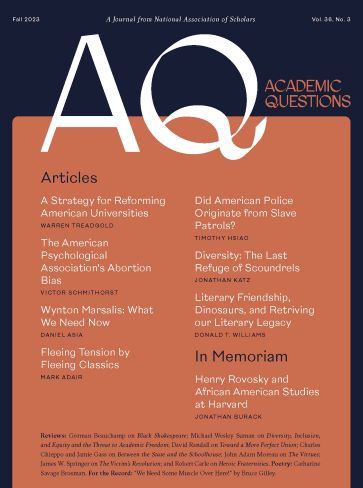Editor’s Note: This article, written by an observant faculty member as a “letter to the editor” sometime around 2005 but never submitted, reminds us that the diversity ideology on campus has remained remarkably unchanged for almost two decades.
The air is full of talk of “diversity,” meaning the ethnic and racial composition of populations, workforces, and (especially) student bodies at universities. This is shorthand for concern about how many members of various “racial” groups are present. Some biologists doubt that race is meaningful for understanding the human population (others don’t), unlike dogs or cattle, but in everyday life the term “race” is used as a proxy for physical appearance.
It is remarkable that the harder it is to evaluate accomplishment, and the less accomplishment matters to an institution, the more concern there is with diversity. In the absolute meritocracy of a used car lot, all that matters is whether a salesman can “move the iron,” and no one talks about diversity. In large corporate bureaucracies, government and academia, in which accomplishment is hard to measure and has only distant effects on the success and survival of the organization, diversity is always on the agenda.
The concern for diversity can be an obsession. For example, at some universities the administrators hardly ever appear to think of anything else. Every public statement must drag in diversity, no matter how irrelevant. No platform or program is complete without a nod to diversity.
The majority of public lectures concern diversity-related issues, with all the other areas of human knowledge and concern, from Shakespeare to molecular biology, confined to a minority. Even the old-fashioned Southern racist occasionally stopped to think about the price of cotton.
Why am I so concerned about universities? Partly because I am a professor, so I see a university close-up every day. Most university faculties have less diversity of thought than the trio of Cotton Mather, Roger Williams, and William Penn. But they don't count, because they belonged to the wrong “race.” And partly because we subject our impressionable young people to universities in their first environment as adults.
University admissions are important because they are crucial to social mobility. That is where a young person with ability and character, but no special advantages or connections, ought to be able to leave his (or her) background behind and join an aristocracy of talent. The more university admissions are clogged with irrelevancies such as diversity, the less opportunity there is for the talented outsider, and the more the ideal of fair play is corroded. At some institutions only ten percent of the places are open to applicants who are not members of some preferred group. Former presidents of Harvard and Princeton recently published a book (The Shape of the River, 2000) advertising the great advantages in life conferred by degrees from those institutions. Prejudice should not affect the award of this privilege.
In the diversity business what matters about people is their “race,” which is taken to determine character, intellect, and moral value. That is the philosophy of National Socialism, with a different Master Race and (so far) no subhumans.
Most university administrators would object to the suggestion that they obtained their philosophy from Mein Kampf. So, let us consider a different hypothesis. University administrators are generally failed or bored academics who have chosen the camaraderie of the committee room over the rigors of the library or laboratory. Their proper task is to improve the quality of research and teaching at their institutions. But this is hard to do, and even harder to evaluate. Worse, the competition is trying equally hard; some institutions will rise in the pecking order, but others must fall, and their administrators are then failures.
Diversity offers a way out. It is easy to proclaim as a goal, and easy to achieve—simply meddle in the procurement, hiring, and student admissions processes until whatever goal has been chosen is reached. Then congratulate yourself on your success, and announce that you will do even better next year. Even the most incompetent administrator can be a winner!
When someone talks about “diversity” he is changing the subject from his proper responsibility—doing his job better. At a university that is improving the quality of teaching and research. At a government agency it is serving the public. In a foundation it is carrying out the donor's wishes. And in a profit-making corporation it is making money for the shareholders. The next time you hear or read “diversity,” substitute “Americanism,” another right-sounding (but now unfashionable) slogan. Both of these are excuses for not doing one's proper job.
Diversity has another attraction. It offers the pygmy Napoleons of administration a chance to interfere in every decision made—procurement, hiring, and, (at universities), student admissions. It keeps them busy and justifies their existence. It is a protection racket—give them a percentage or they will prevent you from hiring or admitting the people you need, or awarding contracts to the lowest or best bidders. It provides administrators plenty of opportunities to do favors for their friends, a natural human desire which, in other circumstances, remains under an ethical cloud. It often amounts to breach of fiduciary responsibility, violation of a public trust, or theft. It is the fashionable form of patronage.
The quest for diversity leads to another poisonous idea, that all decisions should be controlled by a central authority. No power is delegated, no subordinate individual or independent institution is given responsibility, or can act on its own authority, because it cannot be trusted to arrive at sufficiently “diverse”' results. This is a fundamentally totalitarian idea, that power should be centralized rather than dispersed, and diversity is the rich manure in which this poisonous seed is growing.
In 1964 Congress passed, and the President signed, a Civil Rights Act which forbade racial discrimination in most areas of American life. Later, on dubious grounds, the Supreme Court partially suspended this act for twenty-five years. The list of submitters of amicus curae briefs in favor of suspension was remarkable. It included leaders of business, labor (odd bedfellows!), government, and academia. Why?
The Act attempted to establish an individual right not to be subject to racial discrimination. This would increase the rights of individuals in opposition to the power of institutions. Is it surprising that the leaders of those institutions would argue in favor of increasing their power and against the rights of individuals? This is why the people of California passed by initiative Proposition 209 in 1996, outlawing racial discrimination by their state and local governments, over the opposition of leaders of both political parties and most large institutions.
The Fourteenth Amendment to the U. S. Constitution and the Civil Rights Acts confer rights on “persons” and on “citizens.” They do not confer rights on groups. Persons are entitled to equal treatment and non-discrimination. Groups are not entitled to equal results or to equal proportions of their members.
The diversity movement is racist at its core. When dealing with people we should be concerned with intellect, talent, character, and accomplishment. People aren't dogs or cattle; race matters only to racists. Someone who talks about diversity is probably a scoundrel.
The February 13, 2004 issue of the Chronicle of Higher Education contained an article (“‘Intellectual Diversity’: the Trojan Horse of a Dark Design”) by one of the prominent advocates of diversity (a man named Stanley Fish, an administrator and formerly an English professor—surprising, in view of his self-proclaimed limited vocabulary—see the article for details). He asserted that there is no place for intellectual diversity at a university. This fascist idea, that only one kind of thought is acceptable, is unfortunately very influential in academia today. Thus, as Orwell predicted, fascism comes calling itself anti-fascism. In contrast, I assert that intellectual diversity is the only kind of diversity that has any relevance to a university's mission.
Whenever anyone in a position of authority speaks of diversity, he is revealing himself as corrupt and a bigot. Corrupt, because he is planning to use his position to do favors for his friends, and a bigot because he chooses these friends on the basis of their race, sex, ethnicity or other characteristics that an honest man ignores.
Jonathan Katz is Professor of Physics at Washington University; [email protected].
Photo by Pascal Meier on Unsplash














